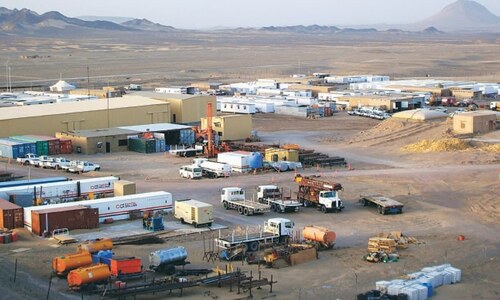ISLAMABAD: Justice Yahya Afridi, a member of the five-judge bench of the Supreme Court which cleared for implementation the fresh Reko Diq settlement deal last year, cautioned his own court to learn from the past and not repeat the judicial adventure of riding on the ‘unruly horse’ of ‘public policy’, that too in its advisory jurisdiction under Article 186 of the Constitution.
In a note issued here on Wednesday, Justice Afridi said the judicial intrusion of the Supreme Court in the 2013 Supreme Court’s Maulvi Abdul Haq Baloch case, known as Reko Diq case, when viewed in retrospect, appears to be a rushed decision when there was no live issue left for determination.
Though Justice Afridi agreed with the opinion when the short order came on Dec 9, 2022, at the time he had said that he would soon clarify his response to the extent of “public policy”.
In its short order, the Supreme Court had approved the Reko Diq settlement — that was finalised after three years of intense negotiations and signed by government of Pakistan with international mining firms to ward off looming $10 billion arbitration penalties.
Apex court’s ‘intrusion’ in Reko Diq case appears to be a rushed decision, says Justice Afridi
The opinion had come in response to a reference sent by President Dr Arif Alvi, seeking the opinion of the Supreme Court by asking whether the court’s 2013 judgement in the Maulvi Abdul Haque Baloch prevents the governments of Pakistan and Balochistan from entering into an implementation agreement, or affect their validity, and if enacted, would the proposed Foreign Investment (Protection and Promotion) Bill 2022 be valid and constitutional.
“The agreements do not, prima facie, violate any of the findings recorded in 2013 Abdul Haque Baloch case,” the Supreme Court had responded in a 13-page short opinion announced by Chief Justice of Pakistan (CJP) Umar Ata Bandial who was heading the five-judge Supreme Court bench.
In his latest note, Justice Afridi said the very mining licence, which was the subject of the petition, had already been cancelled by the appropriate licensing authority. In fact, time has proved that the financial exposure — of $11 billion award — for such a judicial intrusion far exceeded the benefits it aimed to achieve and the financial losses it purportedly claimed to save.
Justice Afridi explained that when the court tests the legal validity of the implementation agreement and the definitive agreement on the touchstone of public policy, what emerges was not simply a “question of law” but a web of complex commercial mining transaction, transcending international borders, thus giving a rise to ‘polycentric issues’.
“In my view, such complex transactions do not cross the threshold of being justiciable as ‘questions of law’ under the advisory jurisdiction of this court,” Justice Afridi said.
Published in Dawn, September 14th, 2023














































Dear visitor, the comments section is undergoing an overhaul and will return soon.